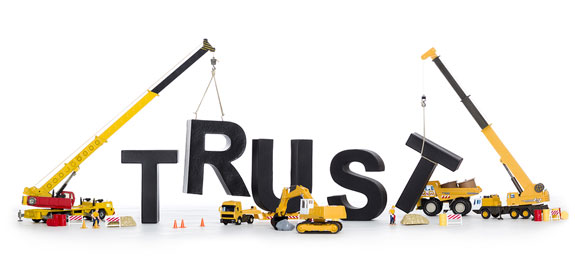Every year, businesses lose billions of dollars due to lack of trust. Theft, dishonesty, and poor performance have a devastating impact on commercial economies across the board.
Warren Buffet has said: “Trust is like the air we breathe. When it’s present, nobody really notices. But when it’s absent, everybody notices.”
You know how it feels to trust someone but you may be challenged to define it. More than likely, you can better explain why you don’t trust someone, a colleague for example. This compelling video by Franklin Covey Speed of Trust, High Cost of Low Trust, shows just how much it costs when trust is absent in the workplace.
Sources of Mistrust
Lack of Integrity
Some people just aren’t honest. They lack credibility. They leave the building with office supplies, make personal phone calls on company lines, and visit their social networking accounts on company time. There will always be those who cheat, steal, cut corners, and look for loopholes and other ways to beat the system.
Performance Deficits
Sometimes managers can’t trust their employees to accomplish the work, especially if the employees lack KSAs (knowledge, skills, and abilities). On the other hand, sometimes the managers exhibit poor leadership and their employees don’t trust them to make sound decisions.
Diminished Morale
Trust is an issue when employees in the workplace feel misunderstood by management. Trust issues can arise when promotions are withheld and accolades are distributed unfairly or based on some political agenda. People find it hard to perform their best work when they don’t trust the system to compensate them fairly.
Making Assumptions
The office grapevine is a notorious source of assumptions and much of what is heard through the grapevine carries only a fine thread of truth. Yet this information can spread quickly and be taken at face value – because you trust the person who shared the information with you. You assume it to be true and feel free to share it with someone else you trust. In a very short time, a long string of people who trust each other have shared misinformation.
How to Build Trust in the Workplace
An effective way to build trust in your organization is to ensure that your personnel receive the training they need to do their best work. Training is often one of the first line items cut in a budget crunch, yet lack of training becomes a high, indirect, and perhaps even hidden cost down the road. Employees are forced to get more done with less resources. Organizations may fail to recognize that a self-directed learning curve, with all its inherent errors and false starts, can be more expensive than providing the training needed to do the job efficiently.
Here are some areas of investment for your organizational training program:
Leadership
Ensure your leaders are confident in their abilities and transparent in their dealings with employees.
Interpersonal Communication
Make sure all members of your staff have a clear understanding of their job responsibilities and that they know how to talk with each other as well as listen to each other.
Team Building
Build dynamic teams of members who can work together and support each other through any organizational challenge.
Conflict Resolution
Train your staff to be able to settle confrontations, deal with disagreements, and resolve negative issues to achieve win-win results.
Trust has incredible value in business, and training in these four critical areas will help build the level of trust in your organization. The most important thing to remember is that trust in the workplace … begins with you.
Calvin Swartz is President and Founder of Progressive Success Corporation, a management consultancy specializing in executive leadership coaching and soft skills training. Reach out to Cal at [email protected] or @AskCalS on Twitter.





